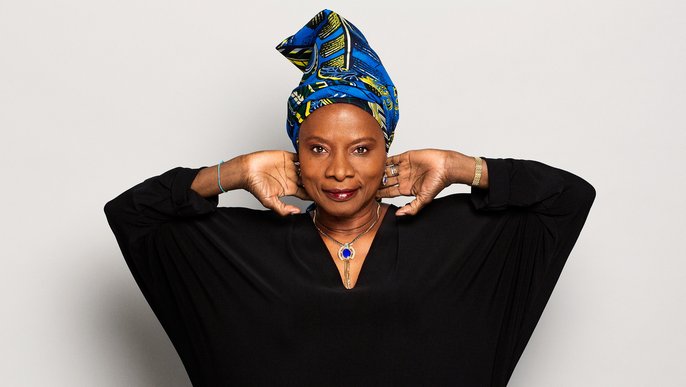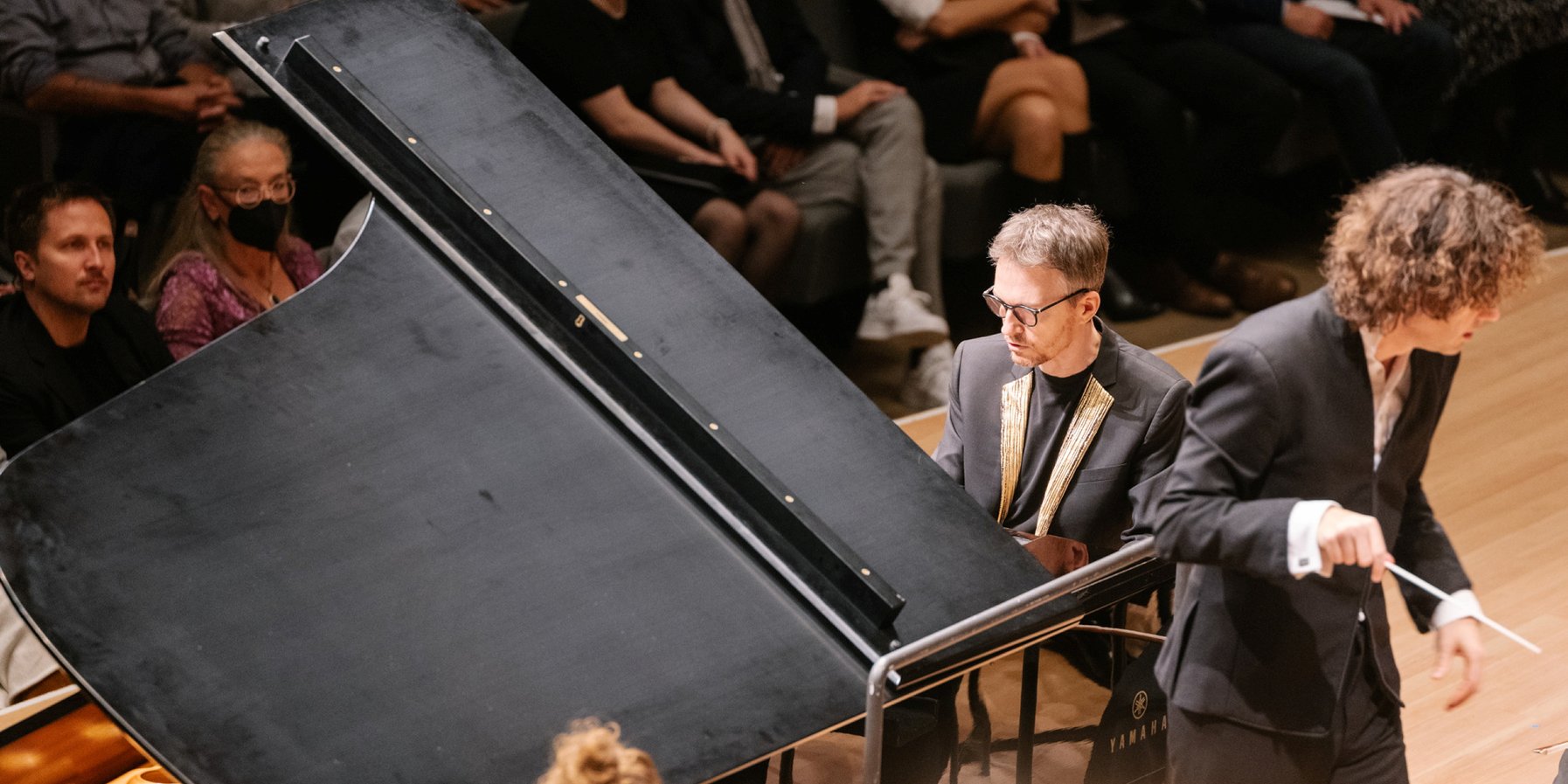»The entire world seems to be contained in Angélique Kidjo's voice,« says pianist Alexandre Tharaud, who has been working with the African singer since 2020. »She brings the world's peoples together in her singing.« The combination of Kidjo and Tharaud may seem odd at first glance, but they actually constitute an artistic match made in heaven. They first met in 2020 at a programme called »An African Odyssey« that Kidjo put on in Paris: they played two songs by Barbara and Charles Aznavour, and got on immediately.
So it comes as no surprise that Alexandre Tharaud is one of the artists chosen by Angélique Kidjo to appear at her »Reflektor« festival at the Elbphilharmonie in March 2023. Their joint chanson project »Les mots d’amour« is without a doubt an insider tip at the well-filled »Reflektor« programme – a rare chance to hear this great pop singer in the intimate setting of a song recital. »She is really looking forward to it herself. Angélique sings almost daily before thousands of people on huge stages. When we perform together, she feels earthed, centred,« says Tharaud, who has won a loyal public in Hamburg, too, as one of today's most sensitive pianists. In this interview he talks about working with Kidjo, about his love of chansons and about why it's important to relinquish control sometimes.
Interview
Angélique Kidjo and you have chosen to call your recital programme »Les mots d’amour« and not »Chansons d’amour«. What's behind the title?
We chose the title based on the words, not the music. Shortly after we first met, Angélique Kidjo said that she'd like to sing about love, which she doesn't normally do in her songs, and in French, which she doesn't normally do either. I then suggested loads of songs to her, and using several filters, we gradually arrived at a list for a concert programme with a total of about 18 chansons.
Angélique wanted to talk intelligently about love, and when you follow that route, you inevitably find yourself talking about separation, about parental love, homosexual love, bestial love, amour fou and first love. The songs we finally chose for our recital are masterpieces without exception, and all stem from France. Some of them are world-famous chansons, others are less well-known. The outcome is a delightful trip: if you look at love from all these different points of view, you're looking at all of life.

»Angélique Kidjo has become an icon of peace.«
Does it also play a role that the authors of the different songs in the recital come from quite a few different countries, reflecting different cultures?
Definitely. We have a chanson by Pierre Lapointe, for instance, an exceptionally gifted Canadian singer-songwriter, and one by Josephine Baker, who had French nationality, but originated from America. I'm not sure if she is so well-known in Germany: she was a very important figure in France, and was symbolically interred in the Panthéon, the national hall of fame in Paris, in the summer of 2021.
In Germany the best-known representative of the French chanson tradition is probably Edith Piaf. Something that makes her so special, not unlike Angelique Kidjo, is that her voice comes from a long way off. What particularly fascinates me about Angélique's voice is that it seems to contain the entire world. She bring's the world's peoples together in her singing, covering the three continents of Africa, America and Europe. And she has become an icon of peace. She sometimes tells me that her voice embraces several generations, that when she sings, she is not the only person singing. There is an inner voice crying out here, something I hear in Piaf's music as well. And it's universal: even if you don't understand what she is singing, this inner cry still makes an impact on the listener.
Alexandre Tharaud & Angélique Kidjo: »La Foule« (Edith Piaf)
We know Angélique Kidjo from her big appearances together with a band or orchestra. This chanson recital offers a much more intimate format. How does that work?
She is really looking forward to it herself. Angélique sings almost daily before thousands of people on huge stages. I think this may take to her to a source of meditation. When we perform together, she feels earthed, centred. Suddenly everything is really easy and the energy seems to be channelled. The concert halls we appear in are much smaller than she's used to. It's my experience that many artists who are always on big stages sooner or later feel a huge need to return to more human dimensions.

Unlike other singers at classical song recitals, Angélique Kidjo uses amplification. How does this affect your piano playing?
As the piano is amplified too, the nuances that are otherwise so important to me don't really matter. In other words, I can really put my foot down without worrying that I'm going to sound louder than Angélique: there's someone at the mixing desk who keeps an eye on things and adjusts the sound if necessary. I've got a monitor myself, but I don't know what the sound is like in the auditorium. That's all very exciting – the opposite of a classical concert, where you're constantly trying to produce the same sound for the audience. At an amplified performance, you really have no idea what the sound is like, it's a bit like in a preserving jar. And that's an interesting experience for a pianist: you don't need to worry about the sound quality at all! You're at the mercy of the mixer sitting in the auditorium, and you just have to trust him to do his job properly.
But surely you don't relinquish control of the sound just because is amplified. Doesn't the sound come first and foremost from your fingers and from the instrument?
Certainly, the instrument plays a central role. I can specify beforehand which Steinway I want to play, depending on the size of the hall. I have a long list on my cellphone of the serial numbers of the Steinways and Yamahas I've played all over the world. It's true that I can control it a little via the monitor, but the sound is different from what the audience hears. You have to trust the sound engineer.
Do you like it that way, or does it make you nervous?
Sometimes it's good to relinquish control. As a solo pianist you don't have any choice, you have to have everything under control all the time. You travel alone, you are on your own in the dressing room, likewise in the hotel… You've got to keep an eye on everything – on the time, on what you need to do the next day, in a month, in five years or ten. You've got to pay attention to everything, you need to be totally organised and to concentrate, especially on your plan for the day.
When I give a solo recital, I rehearse on my own and have to imagine how the music will sound with people in the auditorium. And during the concert, you control everything yourself – no one else intervenes. That has an impact on the life an artist leads. We are the kind of person who runs into trouble when he can't control everything. Settings like this one with Angélique Kidjo offer the opportunity to relax your grip and let someone else look after you.

»Improvisation also means letting go for a soloist.That does me good.«
So is there an element of relief involved?
Absolutely. I walk on to the concert platform and don't need to worry about the sound at all. I can concentrate totally on what I'm going to play – my own arrangements. Some things I even improvise, and improvisation also means letting go for a soloist. That does me good.
You said you suggested loads of songs to Angélique Kidjo. How come you are so well-versed in the world of the chanson?
I have been a total fan of French chansons since childhood, so I know the repertoire inside out. In 2017 I recorded a tribute to the singer Barbara, who is my great role model: she actually made a complete album in German, but the album flopped because she couldn't really sing German. In my eyes, Barbara is the greatest French singer of all time. But there are a lot more French singers I really like. The whole history of the French chanson since the late 19th/early 20th century is so exciting with all the political messages the songs contain, especially for women. Chansons were the vehicle that the female singers used to convey all kinds of messages until after the war.
If it was up to me, the French chanson would be canonised. Yet there is not even a chanson museum in Paris. In Japan they have one!
Interview: Tom R. Schulz, September 2022
English translation: Clive Williams




